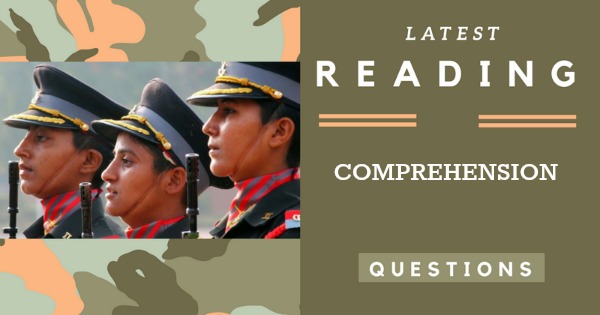Reading Comprehension is the ability to read text, process it and understand its meaning. Simply put, reading comprehension is the act of understanding what you are reading. This understanding comes from the interaction between the words that are written and how they trigger knowledge outside the text. In this section we will share Reading Comprehension Latest MCQs For AFCAT 2017 Exam.
Reading Comprehension Latest MCQs For AFCAT 2017 Exam

Cozette could have been a pretty child, but she was thin and pale and her eyes were stained with weeping. She was dressed in her thin torn cotton dress and she shivered all the tome. Here and there on her body were blue marks from the beatings that her mistress had given her. Her naked legs were red and rough. When she spoke, her voice trembled. Everything about the child, her looks, her behaviour, her speech, her silence every small gesture she made, showed a terrible fear. She was so afraid that, even though she was wet through, she dared not go near the fire to warm herself, but sat shivering in a corner of the room.
1. Cozette could not be a pretty child because
a. She was pale and emaciated
b. She was weeping
c. She was scantily dressed
d. She was trembling with fear
Answer. a
2. Cozette’s voice trembled because
a. She was feeling cold
b. She was frightened
c. There was no fire near her
d. She was wearing a thin, cotton dress
Answer. b
3. Cozette’s terrible fear is conveyed most vividly by the description of
a. Her constant shivering
b. Her tear-stained eyes
c. Her trembling voice
d. Her inability to go near the fire
Answer. d
4. The cause of cozette’s fear is explained by
a. Her pale appearance
b. Her torn dress
c. The blue marks on her body
d. Her speech
Answer. c
Discussions on drug addiction should also be concerned with the vast majority of people who are not addicts. Their homes and lives are insecure because our narcotics laws drive such people to crime. The drug addict is almost never dangerous when he is under the influence of drugs. What makes him dangerous is the desperate need for money to buy the next dose. Drugs are available only in an illegal black market. The costs are stupendous, and this is what drives the addict to steal, rob and even kill.
5. According to the author, discussions of drug addiction are generally concerned with
a. Addicts
b. Non-addicts
c. Criminals
d. Black marketers
Answer. a
6. Addicts take to criminal acts because
a. Drugs make them lose self-control
b. The habit of robbing and stealing is hard to break
c. They need large sums of money to buy drugs
d. Law is powerless against them
Answer. c
7. The author seems to criticize the narcotics laws for
a. Being too lenient
b. Being too complicated
c. Being ineffective
d. Driving addicts to crime
Answer. d
8. The word ‘stupendous’ in the passage means
a. Very high
b. Foolish
c. Shocking
d. Illegal
Answer. a
9. With reference to the passage, consider the following statements :
1. Addiction to drugs is a criminal act.
2. Drug addicts cannot be rehabilitated.
Which of the statements given above is/ are correct?
a. 1 only
b. 2 only
c. Both 1 and 2
d. Neither 1 nor 2
Answer. d
Even in the most primitive societies the great majority of people satisfy a large part of their material needs by exchanging goods and services. Very few people indeed can make for themselves everything they need-all their food, their clothes their housing, their tools. Ever since men started living in communities, they have been satisfying their needs by means of specialization and exchange increasingly each individual has concentrated on what he can do best, and has produced more of the special goods or services in which he has concentrated, than he can consume himself. The surplus he has exchanged with other members of the community, acquiring, in exchange the things he needs that others have produced.
10. Very few people can satisfy their needs today by
a. Providing things for themselves
b. Exchanging goods and services
c. Concentrating in what they can do best
d. Individual specialization
Answer. a
11. Exchange of goods becomes possible only when
a. There is no specialization
b. The goods are produced in surplus
c. Primitive societies become modern
d. Individuals make things for themselves
Answer. b
12. Specialization and exchange began when men started
a. Big industries
b. Concentrating on their work
c. Producing things for individual use
d. Living in communities
Answer. d
13. Exchange of goods and services becomes necessary because
a. Man is a social animal
b. Reciprocity is the law of life
c. Trade and commerce are means of progress
d. We cannot produce everything we need ourselves
Answer. d
I came home from one vacation to find that my brother Ron had brought a dog while I was away. A big burly, choleric dog, he always acted as if he thought I wasn’t one of the family. There was a slight advantage in being one of the family. For he didn’t bite the family as often as he bit strangers. Mother used to send a box of candy every Christmas to the people he bit. The list finally contained forty or more names. Nobody could understand why we didn’t get rid of the dog.
14. Which of the following descriptions fits the dog?
a. The dog was tiny and delicate
b. The dog was sturdy and short-tempered
c. The dog was huge and cool
d. The dog was small and sweet-tempered
Answer. b
15. The dog did not consider the writer as one of the family. What do you think was the consequence of this?
a. The dog barked at him all the time
b. The dog drove him out of his own house
c. The dog behaved with him in an unfriendly way
d. The dog bit him more than he bit others in the family
Answer. d
16. The Christmas list contained more than forty names. What does this suggest?
a. The writer’s mother had a lot of friends
b. The writer’s family celebrated Christmas well
c. The writer’s dog had bitten at least forty people
d. The writer’s mother sent them candy boxes
Answer. c
A lithe girl was learning a history lesson with her governess. All the morning she had been reading it over and hearing it explained by her governess, but no good came of either the reading or the teaching. The governess went over the lesson several times, explained the meaning, and for the last, time, asked her pupil to read it over. After due time had been given, the girl was examined as to her knowledge of the lesson; but not a single answer could she give correctly. The governess lost patience with her, and threatened to punish her unless she could state where a certain treaty was signed.
17. According to the passage, the little girl read the lesson and heard it explained all the morning because
a. The girl did not like her governess
b. The governess could not explain it long enough
c. The girl could not understand it
d. The girl read the lesson only once
Answer. c
18. With reference to the passage, consider the following statements:
1. The governess taught the same lesson several times.
2. The governess wanted to complete her teaching work quickly.
Which of the statements given above is/ are correct?
a. 1 only
b. 2 only
c. Both 1 and 2
d. Neither 1 nor 2
Answer. a
19. After reading the whole passage, which of the following impressions do you think correct about the inability of the girl to answer questions correctly?
a. The dullness of the girl
b. The incompetence of the governess
c. The difficulty of the language
d. The lack of time
Answer. a
20. Which of the following correctly expresses the meaning of ‘lost patience with her’?
a. The inability of the governess to endure further the girl’s failure to answer
b. The governess lost her enthusiasm to teach the girl
c. The governess felt that the girl cannot be taught the lesson
d. The governess felt that she was not good enough to teach the girl
Answer. a








